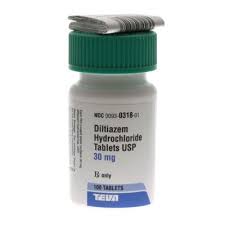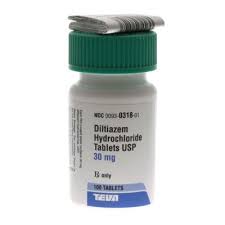Providing Quality & Trust || Clinic Website
Detailed Description
Diltiazem Hydrochloride (HCL) Tablets, USP
(dil-tye-a-zem)
- Generic of Cardizem® Tablets
- Description: Calcium Channel Blocker
- Other Names for this Medication: Cardizem®, Cartia XT®, Matzim LA®, Tiazac®, Taztia XT®, Dilt-XR®
- Common Dosage Forms: Veterinary: None.
Key Information:
- Calcium channel blocker used in dogs, cats, & ferrets for supraventricular tachycardias (SVT), pulmonary hypertension, systemic hypertension, or hypertrophic cardiomyopathy; may prove useful in horses in combination with quinidine to treat atrial fibrillation.
- Contraindications: Severe hypotension, sick sinus syndrome, or second & third degree AV block, acute myocardial infarction (MI), radiographically documented pulmonary congestion, hypersensitivity.
- Caution: Geriatric patients or those with heart failure (particularly if also receiving beta blockers), or hepatic or renal impairment.
- Potential teratogen (high doses).
How is this medication useful?
Diltiazem works on the heart by changing how calcium is used to treat heartrhythm problems in dogs and cats and some forms of feline heart disease.
- The FDA (U.S. Food & Drug Administration) has approved this drug for use in humans, butitis not officially approved for use in animals.
- The FDA allows veterinarians to prescribe products containing this drug in different species or for other conditions in certain situations.
You and your veterinarian can discuss why this drug is the most appropriate choice.
Diltiazem hydrochloride tablets USP are a calcium ion cellular influx inhibitor (slow channel blocker or calcium antagonist). Chemically, diltiazem hydrochloride, USP is 1,5-Benzothiazepin-4(5H)one,3-(acetyloxy)-5-[2-(dimethylamino)ethyl]-2,3-dihydro-2-(4-methoxyphenyl)-,monohydrochloride,(+)-cis-.
- Medication often used to help treat hypertension or cardiomyopathy.
Available:
This product is sold by the individual tablet. When ordering by the individual tablet, please order a quantity greater than 1 tablet at a time.
Dosage:
Dogs:
- Supraventricular tachyarrhythmias (extra-label):
- Note: Dosage recommendations can vary significantly and evidence supporting any dosage recommendation is not strong. The following are adapted from multiple sources:
- Acute treatment of supraventricular tachycardia: Initially, 0.05 mg/kg IV administered over 1-2 minutes. May repeat this dose up to 2 times with 5 minutes between doses. Some cardiologists use a dose of 0.25 mg/kg IV administered over 2-5 minutes; if required, dosage may be carefully increased up to a total dose of 0.75 mg/kg IV. Oral dosage suggestions include 0.5 mg/kg PO followed by 0.25 mg/kg PO every hour until conversion or a total oral dose of 1.5 – 2 mg/kg has been given.
- Chronic treatment of supraventricular tachycardia: Initially, 1 mg/kg PO every 8 hours and titrated upward to a maximum of 4 mg/kg PO every 8 hours. Doses from 2 – 4 mg/kg every 8 hours should probably not be given to dogs that have moderate to severe myocardial failure or with significant cardiac compromise due to any reason. Dosages required for this indication are generally higher than those needed in atrial fibrillation to control ventricular rate.
- Decreasing ventricular rate associated with atrial fibrillation (extra-label):
- Using regular tablets, initially 0.5 – 1.5 mg/kg PO every 8 hours. Titrate upward if necessary. Using a sustained-release product initially 3 – 5 mg/kg PO every 12 hours. Dosage may carefully be titrated upward if required.
- One prospective, randomized crossover, clinical trial study in 18 dogs demonstrated that digoxin and diltiazem used together had a more effective ventricular rate reduction in dogs with secondary atrial fibrillation than when either was given alone, but it still remains unknown if this translates into decreased morbidity or mortality. Dosages used in the study were digoxin at approximately 0.005 mg/kg PO every 12 hours, and diltiazem (extended-release; Dilt-XR®) at approximately 3 mg/kg PO every 12 hours.
Cats:
- Adjunctive treatment of hypertrophic cardiomyopathy; supraventricular arrhythmias (extra-label): Dosage recommendations vary and evidence is not strong supporting any dosage. Diltiazem is usually dosed orally. If using the regular tablets, dose at 7.5 – 15 mg per cat PO every 8-12 hours. If using a sustained-release product, 30 – 45 mg per cat PO every 24 hours is employed.
- Note: Using compounded capsules made from the pelleted beads or ½ of a 60-mg pellet is preferred over the sustained-release tablets.) If emergency IV treatment is required: 0.125 – 0.25 mg/kg IV over 2 minutes; with subsequent boluses at 15 minute intervals until conversion to a normal sinus rhythm or to a total dose of 0.75 mg/kg IV has been recommended.
Ferrets:
- Hypertrophic cardiomyopathy (extra-label): 2 – 7.5 mg/kg PO every 12 hours; adjust as necessary. May result in heart block.
Note: Oral diltiazem is available in numerous human dosage forms, including several different types of sustained-release products; there is only limited information available on their pharmacokinetics in dogs or cats. There are multiple trade names and strengths, and four basic technologies: Standard release tablets, sustained release capsules containing coated beads, sustained release compressed tablets containing coated beads, and sustained release capsules containing multiples of 60-mg pellets. Sustained release products for use in small animals are most commonly reformulated (compounded) capsules using the coated beads or pellets.
Active Ingredients:
- diltiazem hydrochloride
Storage/Stability:
Diltiazem oral products should be stored at room temperature in tight, light resistant containers.
The powder for injection should be stored between 15°C-30°C. Discard 24 hours after reconstituting.
Uses/Indications:
Diltiazem hydrochloride tablets USP are indicated for the management of chronic stable angina and angina due to coronary artery spasm.
Diltiazem may be useful in dogs for supraventricular tachycardia or decreasing the ventricular rate associated with atrial fibrillation. One study demonstrated that digoxin and diltiazem, used together, had more effective ventricular rate reduction in dogs with secondary atrial fibrillation than when either was given alone. However, it still remains unknown if this translates into decreased morbidity or mortality. In cats, diltiazem is used for the treatment of feline hypertrophic cardiomyopathy, but enthusiasm for its use for this indication has cooled somewhat in recent years. Diltiazem potentially could be used for hypertension, pulmonary artery hypertension, and adjunctive treatment of acute kidney injury.
Use as directed by veterinarian
Precautions/Warnings:
Diltiazem is contraindicated in patients with severe hypotension (<90 mm Hg systolic), sick sinus syndrome, or second or third degree AV block (unless a functioning pacemaker is in place), acute myocardial infarction, radiographically documented pulmonary congestion, or when the patient is hypersensitive to it.
Diltiazem should be used with caution in geriatric patients or those with heart failure (particularly if also receiving beta blockers), or hepatic or renal impairment.
If giving direct IV administration (push), give slowly over at least 2 minutes.
Powered by nopCommerce
This site is running in live payment mode. Real payments will be processed.

